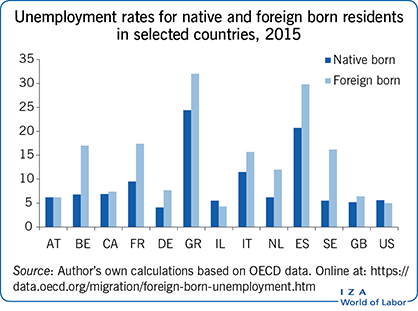Elevator pitch
The adverse effects of unemployment are a cause for concern for all demographic groups but they will be most acute for those experiencing the highest unemployment rates. In particular, high levels of unemployment are observed for a range of immigrant groups across many countries. However, there is considerable variation both across and within countries. It is therefore important to determine the factors that are most likely to cause high rates of unemployment, especially from a migration perspective, and to identify appropriate policy responses (e.g. enhancing human capital and improving job search effectiveness).

Key findings
Pros
Unemployment rates are lower for some immigrant groups than for the native born population.
The impact of economic downturns is lessened for more highly educated immigrants.
Policies that enhance human capital levels can be effective in reducing the high rates of unemployment experienced by immigrant groups.
Improving language skills is crucial for increasing the employment prospects of immigrants.
Cons
Certain immigrant groups, such as those with low levels of education, experience extremely high rates of unemployment, especially during recessions.
The unemployment rates of immigrants can be higher in countries that have more rigid labor market regulations and institutions.
Comparing countries can be difficult due to differences in their migration histories.
Newly arrived immigrants are often disadvantaged in terms of their country-specific skills and their knowledge of the labor market.